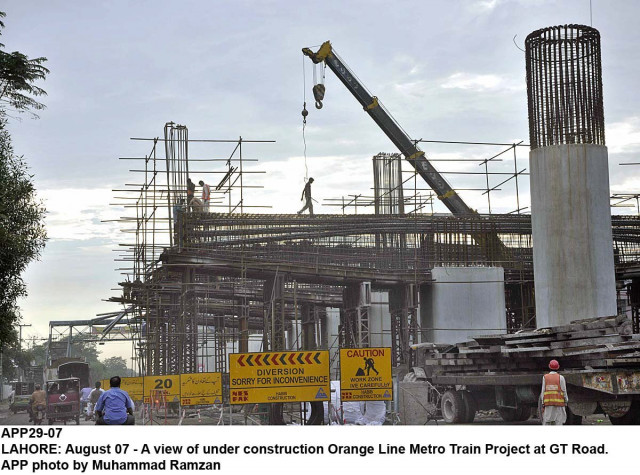Apex court questions LHC’s Orange Line verdict
Justice Ejaz Afzal Khan asks how court stayed construction without getting expert opinion

PHOTO: APP
On Tuesday, a five-member bench of the apex court on Tuesday continued to hear an appeal filed by the provincial government against the LHC’s August 2016 order suspending construction of the Rs45 billion Orange Line Metro Train within 200 feet of 11 historical sites in the city.
“We want to know how the high court can decide this case without getting an expert opinion,” said Justice Ejaz Afzal Khan, who is heading the bench.
Khawaja Ahmad Hassan, the counsel for respondents – civil society members who had challenged the Orange Line’s construction in the LHC – told the apex court that a team from UNESCO wanted to visit Pakistan in January to assess the impact of the train project on Shalimar Garden and other heritage sites. The government, however, did not issue visas to them. Hassan added the team is still interested in visiting in April.
No one will be allowed to damage heritage sites, SC tells govt
Justice Khan remarked it was painful that instead of relying on Pakistani experts, they had to wait for outsiders who would teach them the value of our own heritage.
The effects of vibration velocities on the sites once the train is functional were also discussed during the hearing.
Makhdoom Ali Khan, the counsel for Punjab Mass Transit Authority, told the court that the actual vibrations from the running trains will be less than what has been permitted in the project, and it will not affect the 11 historical sites.
Justice Khan observed that other trains operating in the country are heavier and create more vibrations, but nothing happens to the small houses that are built close to railway tracks.
The hearing will resume on Wednesday.
In Monday’s hearing, the court had stated that it would not allow these sites to be damaged, while National Engineering Services Pakistan’s (Nespak) counsel had concluded his arguments after showing the court a video of the complete train route and contending no harm would come to the sites during or after construction.



















COMMENTS
Comments are moderated and generally will be posted if they are on-topic and not abusive.
For more information, please see our Comments FAQ